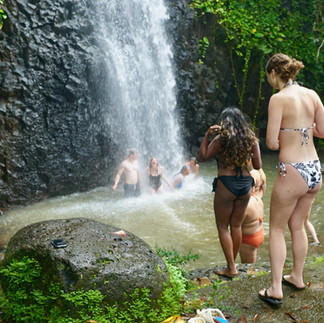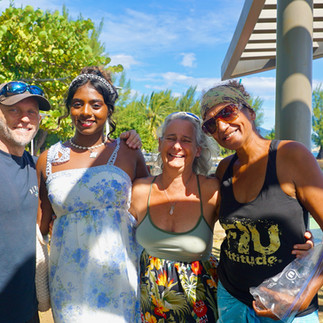Faith, Culture & Connection: Principia College’s Educational Journey in Tahiti & Moorea
- Ozan Isabelle
- Jul 1, 2025
- 7 min read
Updated: Jul 7, 2025
From May 27 to June 23, 2025, we had the joy and honor of welcoming a remarkable group of students, led by faculty officer Julien and resident counselor Winnie, from Principia College, Illinois, USA—a college deeply rooted in Christian Science values. Their stay with us at Fare Om in Moorea was not only an opportunity to learn French and explore Polynesian culture and nature, but a journey shaped by spiritual purpose, community connection, and global understanding.

A Mission Beyond Learning
Principia College’s mission—to serve the cause of Christian Science through education—was reflected in every aspect of their experience. From thoughtful discussions to conscious engagement with local issues and spiritual exploration of cultural differences, the group brought a sense of purpose and respect that touched everyone at Fare Om.
Educational & Cultural Immersion in Moorea
Throughout their nearly month-long visit, students took part in a vibrant program of learning, including daily French and culture classes.
Here’s a glimpse of just a few of their many activities:
🌿 Visit to Te Fare Natura Ecomuseum (Moorea)
This visit offered students an insight into Polynesia’s unique biodiversity and environmental challenges. With interactive exhibits and knowledgeable guide, students explored native species, conservation efforts. It served as a powerful introduction to the island's natural heritage and the cultural importance of sustainability in Polynesia.
🌊 Coral Preservation Workshop and Snorkeling at Motu Ahi
During their stay on the nearby islet of Motu Ahi, students took part in a hands-on marine conservation workshop. Led by local environmentalists, they learned about the threats facing coral reefs, reef regeneration projects, and the fragile ecosystems of the lagoon. Following the workshop, students snorkeled through coral gardens, encountering tropical fish, and other marine life—connecting their classroom learning to direct experience.
🥁 Polynesian Dance Lessons (Ongoing + Final Performance)
Throughout the stay, students engaged in traditional ‘ori Tahiti (Polynesian dance) and music lessons. Under the guidance of local dance teachers, they practiced foundational steps and learned about the cultural significance of each movement. The experience culminated in a final performance that was both joyful and emotional.
🔥 Conference on Polynesian Tattoo Culture
A local tāvana (tattoo artist) offered a presentation on the rich symbolism and sacred traditions of Polynesian tattoos. Students learned how tattoos serve not only as art but as identity markers, rites of passage, and records of ancestry and achievements. The session included examples of modern and traditional tools and stories of revival and cultural pride within today’s tattooing practices.
🍽️ Polynesian Cooking Class Using Survival Plants
Led by Fare Om's own team, students prepared a traditional meal using foraged and native ingredients such as uru (breadfruit), coconut, taro, and wild herbs. The session focused on traditional food sustainability, survival techniques, and respect for natural abundance. Students prepared meals communally, reinforcing the spirit of shared learning.
⛪ Immersion with Papetoai Protestant Church Community
In a beautiful moment of cross-cultural spiritual connection, students attended a community day with the local Protestant church in Papetoai. They shared music, prayer, and conversation with Polynesian families, discovering both the similarities and unique expressions of faith in the Pacific. It was a day of harmony, hospitality, and meaningful Christian fellowship.
🧵 Cultural Workshop on Rae Rae (3rd Gender in Polynesia)
This sensitive and eye-opening session introduced students to the Rae Rae, individuals in Polynesian society who represent a third gender, traditionally respected for their unique social and cultural roles. The workshop included a discussion on gender identity and inclusivity.
🧠 Conferences on Plastic Reduction & Polynesian Economy
Two important lectures expanded the group’s awareness of regional challenges and innovation. The plastic reduction session addressed grassroots movements and new policies aimed at environmental protection. The second talk provided an overview of the Polynesian economy, exploring tourism, agriculture, and ongoing efforts toward economic autonomy and resilience.
Key Moment of the Tahiti Visit

In Dialogue with Leadership: A Thought-Provoking Q&A with Minister Ronny Teriiapaia
A true highlight of Principia College’s visit to French Polynesia was the rare and meaningful opportunity to engage directly with Mr. Ronny Teriiapaia, the Minister of Education. The meeting was held at the Ministry in Papeete and took the form of an open and honest question-and-answer session between the students, their faculty, and the Minister. It offered an illuminating look at the current educational landscape in Tahiti and the islands, and how it is evolving to reflect local values, culture, and aspirations.
The conversation covered a wide range of pressing and inspiring topics, revealing both the challenges and the innovations in the Polynesian education system today:
1. Balancing Cultural Identity with the French National Curriculum
One of the central themes discussed was the tension between centralized French education policies and Polynesia’s local cultural needs. The Minister spoke about the growing movement to embed Polynesian language, history, and values within the school curriculum, and the efforts to reclaim cultural autonomy while still meeting national academic standards.
“Education should not only prepare our children to pass exams, but to love their land, understand their heritage, and serve their communities,” Mr. Teriiapaia said.
2. Reviving and Integrating Polynesian Languages in Education
Minister Teriiapaia addressed the importance of revitalizing Tahitian (Reo Tahiti) and other native languages such as Marquesan and Pa’umotu. He emphasized how these languages are not just communication tools, but vessels of spirituality and ancestral knowledge.
Students learned that while French remains the primary language of instruction, there is a growing number of bilingual programs and language immersion models being in development, especially in primary schools.
3. Technology, AI, and Digital Learning in the Island Context
In response to questions about digital literacy and the integration of AI tools, the Minister discussed both the potential and limitations. He explained that while technology can broaden access to global knowledge, it must be introduced thoughtfully and responsibly, especially in communities where excessive screen time may replace cultural and nature-based learning.
4. Family and Community Involvement in Schools
The group was curious about how Polynesian families are involved in their children’s education. The Minister stressed that in island culture, education is a shared responsibility, and many initiatives are underway to strengthen the parent-school relationship.
5. Higher Education & International Exchange
The Minister welcomed the idea of international academic partnerships, and even encouraged the students to consider coming back for internships or future research projects. He acknowledged the geographic isolation of the islands, but shared that more programs are in development to help local students travel abroad and to welcome visiting scholars and learners.
6. Systemic Challenges: Infrastructure, Teacher Retention & Equity
Not shying away from real challenges, Minister Teriiapaia was candid about the uneven distribution of resources between urban and remote schools, the difficulty of retaining qualified teachers on smaller islands, and the gaps in access to higher education for youth in outer archipelagos. He expressed hope, however, that community-based solutions and stronger teacher training pathways could help build resilience into the system.
✨ Takeaway from the Session
For the students of Principia College—many of whom are studying education, public policy, or cultural studies—this meeting was an unforgettable window into how a society shapes its future through education. It sparked meaningful dialogue about what it means to educate with heart, history, and hope, especially in communities where ancestral knowledge and modern tools must coexist.
A Deeper Appreciation for Local Governance
After the Q&A session, the group was invited on a guided tour of the Presidential Palace, where they explored the elegant state reception rooms and learned more about the structure of Polynesian self-government within the French Republic. It was a unique chance to understand the blend of indigenous leadership traditions and French institutional frameworks.
Tahiti Cultural and Natural Discoveries: Immersed in the Spirit of the Land
From June 3–5, the Principia College group continued their Polynesian journey with a three-day stay on the island of Tahiti, where they experienced the island’s natural beauty and contemporary culture.

Visit to Te Mana o Te Moana (Sea Turtle Conservation Center)
At this marine sanctuary, students observed sea turtles while learning about the threats they face from pollution, boat traffic, and climate change.
Grottes de Maraa – Nature Wrapped in Legend
The visit began with a stop at the Grottes de Maraa, a series of stunning natural caves veiled in tropical vegetation. These sacred grottos, formed over centuries by freshwater springs and lava flows, hold a mystical presence in Tahitian lore.
The Three Waterfalls – Cascading Wonders of the East Coast
Next, the group ventured to Tahiti’s Three Waterfalls (Les Trois Cascades) nestled in the east coast's valleys.These waterfalls are not only awe-inspiring in their beauty but also serve as powerful symbols of Polynesian reverence for freshwater as a life-giving force.
Tautira and the Plateau – Sacred Stillness of the Peninsula
On the southern Peninsula, students traveled to Tautira, one of the island’s most serene and culturally rooted villages. There, they ascended to the nearby plateau, a vast, open space of sacred and historical significance. Often described as the “end of the road,” this region holds a calm and contemplative energy.
Tahara Beach – Lagoon Leisure and Local Living
A well-earned break followed at Tahara Beach, where the group enjoyed a lagoon-side picnic.The crystalline waters and soft sands provided the perfect spot to relax, laugh, and share impressions from the previous days.
Papeete’s Mural Walk – Urban Stories in Color
In the capital city of Papeete, students were led by Sophie on a guided mural art walk, exploring the city’s walls transformed into large-scale visual narratives. These street murals, created during the annual ONO’U International Urban Art Festival, blend Polynesian traditions with global street art trends. Each piece tells a story — of resilience, identity, spirituality, or resistance.
Hava’e Lodge, Teahupo’o – The Soul of Surfing
For their accommodation, students stayed and continue their education at the cozy and eco-friendly Hava’e Lodge, located in Teahupo’o, home to one of the world’s most legendary surf breaks — and the site of the Olympic Games 2024 surfing competition. The group was immersed in the area’s deep surfing culture, where local life is attuned to tides, waves, and the powerful presence of the sea.
A Journey of Faith, Growth & Global Citizenship
The visit of Principia College was more than just a study abroad—it was a meaningful exchange between cultures, faith traditions, and generations. It was a reminder that education is not only academic, but spiritual, personal, and human.
At Fare Om, we were enriched by the presence of these curious, kind-hearted students and educators who brought with them an attitude of respect and openness. Their journey here left a lasting impact on our team and local partners.
We look forward to welcoming Principia again and continuing this bridge between spiritual education and cultural immersion, guided by the values that unite us all.
























































































Comments